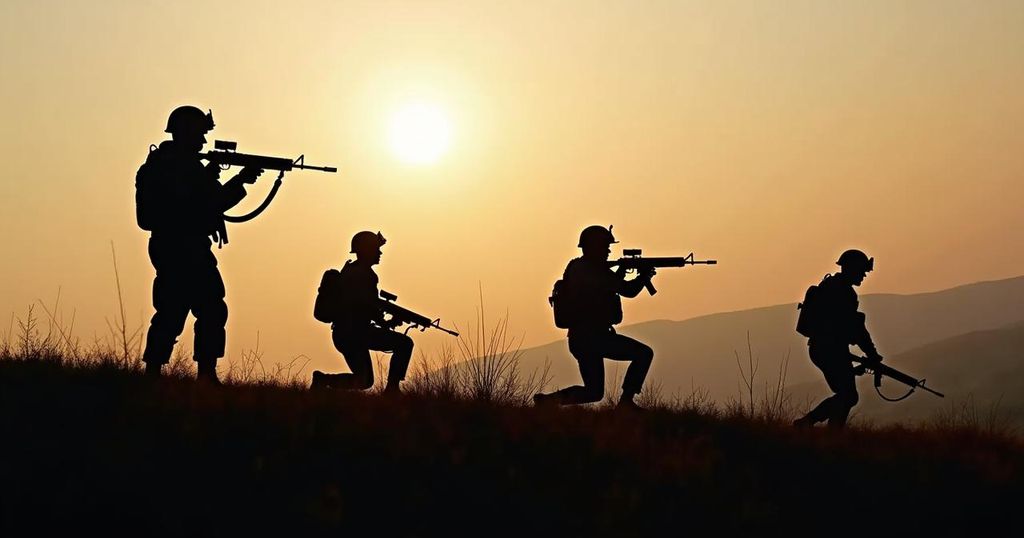Kazakhstan is conducting the “Indestructible Brotherhood-2024” command-staff drill from September 26 to October 7, featuring military personnel from CSTO member states. The exercise aims to enhance peacekeeping capabilities and operational deployment among forces from Russia, Belarus, Kyrgyzstan, Tajikistan, and Kazakhstan, led by Major-General Almaz Dzhumakeyev. The CSTO, formed in the early 1990s, has established a peacekeeping force for intervention within its member nations, although Armenia has announced plans to withdraw from the organization amid growing tensions with Moscow.
Kazakhstan is hosting a command-staff drill for the Collective Security Treaty Organization (CSTO) Collective Peacekeeping Force called “Indestructible Brotherhood-2024,” which is taking place from September 26 to October 7. As reported by Kazakhstan’s Ministry of Defense and highlighted by the CSTO press center, military personnel from Russia, Belarus, Kyrgyzstan, and Tajikistan have joined Kazakh forces in these joint operations at the Bereg training ground located in the Almaty region. The exercises aim to enhance the operational deployment of collective forces, including the ease of movement for troop contingents, and to bolster the peacekeeping capabilities of the CSTO. Major-General Almaz Dzhumakeyev of Kazakhstan’s Airborne Assault Troops is overseeing the entire exercise focused on preparing for peacekeeping operations. The CSTO members agreed on October 6, 2007, to significantly expand the organization to establish a CSTO Peacekeeping Force. This force can be deployed either under a United Nations mandate or independently in situations involving member nations. Subsequently, on December 10, 2010, a formal declaration was made to establish the CSTO Peacekeeping Force, alongside other agreements among member states. The peacekeeping forces consist of specially trained military, police, and civilian personnel from the CSTO countries, with the specifics regarding the composition and size of missions determined by the CSTO Collective Security Council based on the unique circumstances and tasks at hand. Currently, the CSTO comprises Russia, Armenia, Belarus, Kazakhstan, Kyrgyzstan, and Tajikistan. However, Armenia’s Prime Minister, Nikol Pashinyan, has announced plans for the country to withdraw from the CSTO, signaling tensions with Moscow.
The Collective Security Treaty Organization (CSTO) is a military alliance founded in 1992, aimed at ensuring security and defense among its member states, which currently include Russia, Armenia, Belarus, Kazakhstan, Kyrgyzstan, and Tajikistan. The organization has established a peacekeeping force to address conflicts within member territories and collaborate effectively under various mandates. The current drill, “Indestructible Brotherhood-2024,” represents a significant step in strengthening member nations’ operational capacity for peacekeeping missions. This drill reflects Kazakhstan’s chairmanship role in the CSTO for this year and outlines priorities for enhancing military cooperation among the member states. The withdrawal of Armenia from the CSTO raises questions about the future cohesion and effectiveness of the alliance in collective defense efforts.
The command-staff drill “Indestructible Brotherhood-2024,” hosted by Kazakhstan, marks a critical operation for the CSTO, unifying military forces across member states to enhance joint peacekeeping capabilities. Under the leadership of Major-General Almaz Dzhumakeyev, this exercise emphasizes the importance of operational deployment and seamless troop movement. The CSTO’s foundational decisions regarding its peacekeeping force and the current tensions surrounding Armenia’s withdrawal from the organization highlight both the challenges and significance of maintaining regional security through collective defense arrangements.
Original Source: asiaplustj.info







